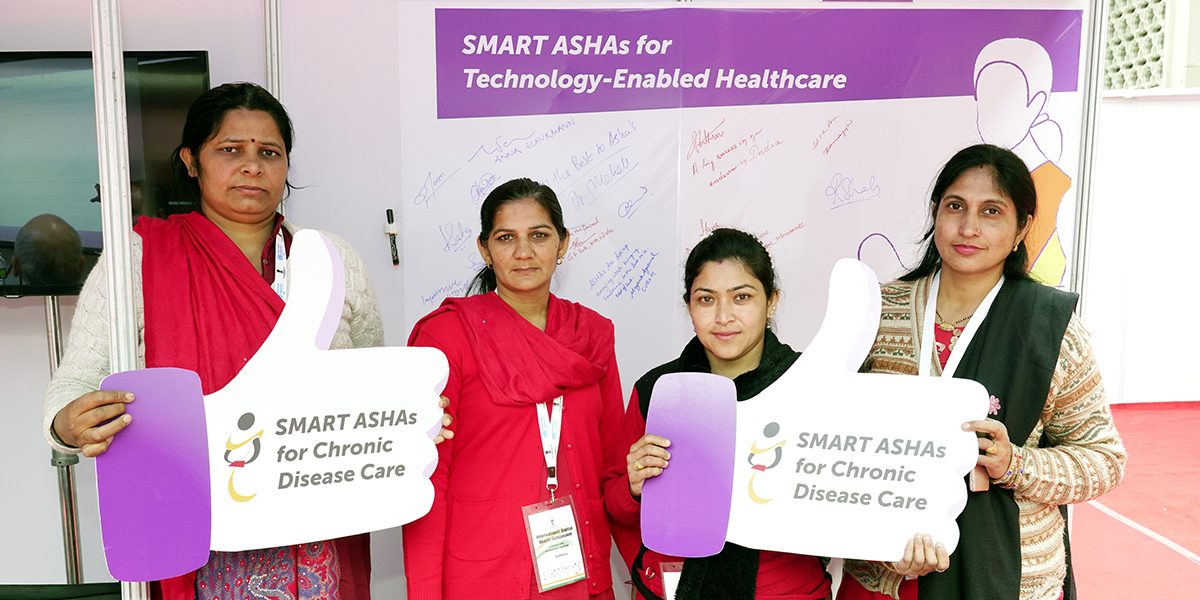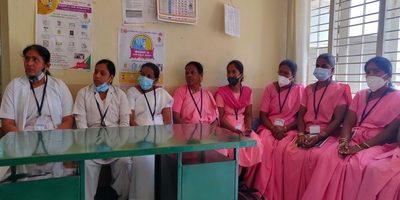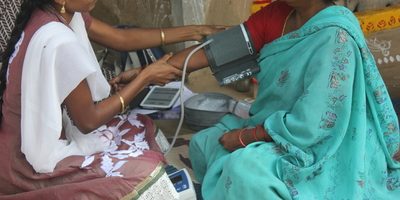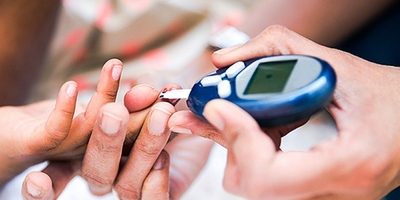
Thumbs up for India’s frontline health care workers at International Digital Health Symposium 2019
The role of frontline health care workers in providing last mile delivery to the doorstep of people in rural areas of the country received a roaring thumbs up in the Capital on Wednesday as some of the delegates to the International Digital Health Symposium 2019 met and interacted with four of these “doctor sahibas” from the community who are screening people in their villages for non-communicable disease risk.
These ASHA workers had come all the way from villages in and around Rohtak in Haryana to demonstrate their capabilities in using technology for screening non-communicable diseases.
“It is great to see the frontline health care workers playing a stellar role using technology and taking health care to the doorstep of the people”, wrote a visitor at the large signature board displayed in the exhibition stall that was manned by the George Institute for Global Health, India.
Others wrote, “keep up the good work you all are doing in the community” and “Empowering ASHA’s is close to getting qualified/skilled health care solutions to the last mile population”.
The exhibition which was part of the International Digital Health Symposium 2019 and had government, academics and civil society representatives displaying their capabilities in digital health and how it can transform healthcare delivery. It was inaugurated by the Minister of State for Health and Family Welfare, Ms Anupriya Patel along with Preeti Sudan, the Health Secretary and other distinguished political and government leaders from other countries who were part of the inaugural panel.
The exhibition was an opportunity for the high-level functionaries and experts attending the symposium to interact with the service delivery people on the ground and see how things can improve considerably with digital health, whether it is health ATMs, use of tablets and apps or robotics and computer-aided design. Visitors to the ASHA workers stall also had their photos taken with them with a placard that said, 'Thumbs up to ASHA’s for chronic disease care'.
While the two day summit and symposium organised over the past three days drew ministers, top-level government heads, academics and civil society representatives from across the world who rallied behind the Delhi declaration that affirmed the role of technology in health-care delivery, the ground level exhibition provided an insight into the kind of technologies that are being developed to tackle various health challenges.
The ASHA workers from Rohtak had come all prepared to demonstrate what they are doing in the community. Armed with blood sugar and blood sugar monitoring equipment, they confidently demonstrated the screening for high-risk diabetes, hypertension and cardio-vascular disease that they are doing in the community.
“If the ASHA at the end of the chain does not feel empowered with the tablet in her hand, the whole purpose of digital health is meaningless,” said a speaker at the symposium which summed up the need for grassroots connect when it comes to digital health and technology.
“I am delighted to be participating in this international symposium and exhibition and demonstrating the work we are doing in the community,” said Geeta, one of the ASHA workers from Rohtak. Geeta has been trained to screen people living in urban areas of Rohtak slums for diabetes risk by a public health and community medicine expert team from the Pandit B.D.Sharma University of Health Sciences in Rohtak and researchers from the George Institute for Global Health. The training is part of a global health care delivery project called SMARThealth as part of which community health workers are being prepared for technology-enabled health care delivery. The project has shown encouraging results in India, Indonesia and a few other countries like in the UK and Australia.
Experts from the George Institute also participated in the discussions and deliberations held at the symposium. This included Prof Kasim Rahimi of the Oxford Martin School based in the UK; Dr. Maoyi from the George Institute, China and Prof Vivekanand Jha, Executive Director, George Institute for Global Health, New Delhi.









